EDU10004: Examining Behaviourist and Sociocultural Theories
VerifiedAdded on 2023/04/21
|8
|2593
|217
Essay
AI Summary
This essay provides a comparative analysis of behaviourist and sociocultural theories of learning. The behaviourist theory emphasizes stimulus-response and reinforcement, viewing the learner as passive, while sociocultural theory highlights the role of social interaction and cultural context in shaping an individual's development. The essay discusses the core principles of each theory, including classical and operant conditioning in behaviourism, and concepts like observational learning, self-efficacy, and reciprocal determinism in sociocultural theory. It explores the benefits and limitations of both approaches, noting behaviourism's effectiveness in structured learning environments and sociocultural theory's applicability in understanding learning across different developmental levels. The essay concludes that both theories offer valuable insights into the learning process, with behaviourism focusing on observable behaviours and sociocultural theory emphasizing the social and cultural influences on cognitive development.
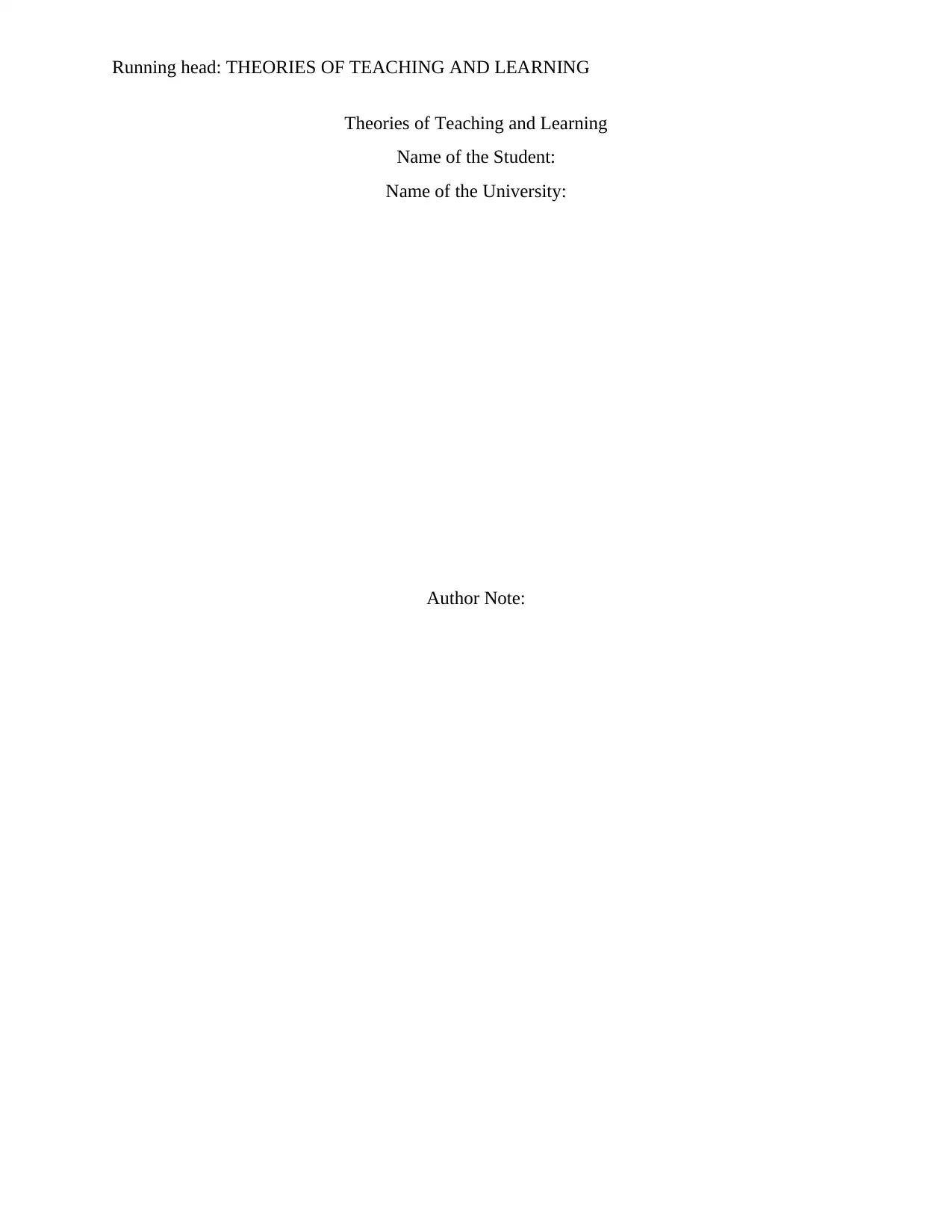
Running head: THEORIES OF TEACHING AND LEARNING
Theories of Teaching and Learning
Name of the Student:
Name of the University:
Author Note:
Theories of Teaching and Learning
Name of the Student:
Name of the University:
Author Note:
Paraphrase This Document
Need a fresh take? Get an instant paraphrase of this document with our AI Paraphraser
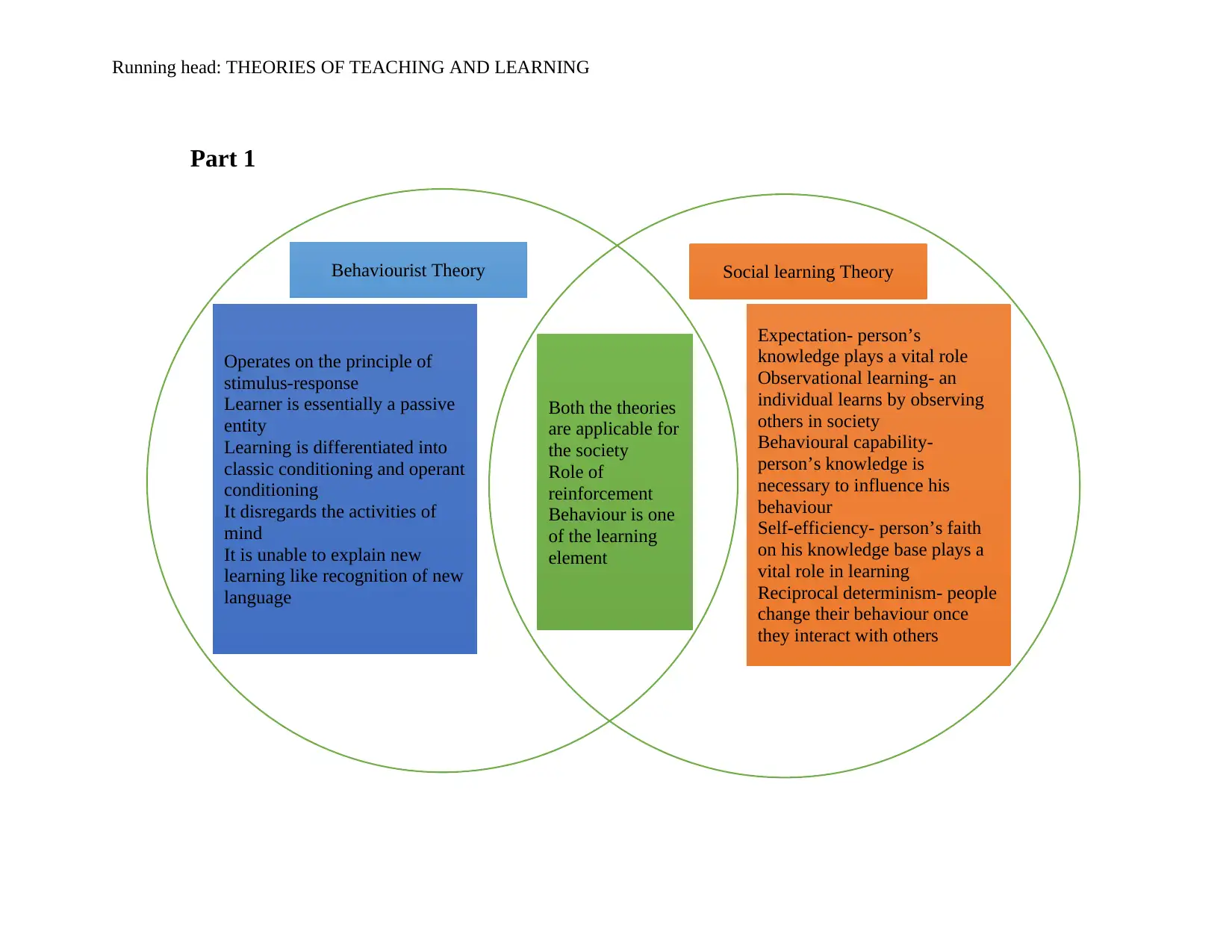
Operates on the principle of
stimulus-response
Learner is essentially a passive
entity
Learning is differentiated into
classic conditioning and operant
conditioning
It disregards the activities of
mind
It is unable to explain new
learning like recognition of new
language
Expectation- person’s
knowledge plays a vital role
Observational learning- an
individual learns by observing
others in society
Behavioural capability-
person’s knowledge is
necessary to influence his
behaviour
Self-efficiency- person’s faith
on his knowledge base plays a
vital role in learning
Reciprocal determinism- people
change their behaviour once
they interact with others
Behaviourist Theory Social learning Theory
Both the theories
are applicable for
the society
Role of
reinforcement
Behaviour is one
of the learning
element
Part 1
Running head: THEORIES OF TEACHING AND LEARNING
stimulus-response
Learner is essentially a passive
entity
Learning is differentiated into
classic conditioning and operant
conditioning
It disregards the activities of
mind
It is unable to explain new
learning like recognition of new
language
Expectation- person’s
knowledge plays a vital role
Observational learning- an
individual learns by observing
others in society
Behavioural capability-
person’s knowledge is
necessary to influence his
behaviour
Self-efficiency- person’s faith
on his knowledge base plays a
vital role in learning
Reciprocal determinism- people
change their behaviour once
they interact with others
Behaviourist Theory Social learning Theory
Both the theories
are applicable for
the society
Role of
reinforcement
Behaviour is one
of the learning
element
Part 1
Running head: THEORIES OF TEACHING AND LEARNING
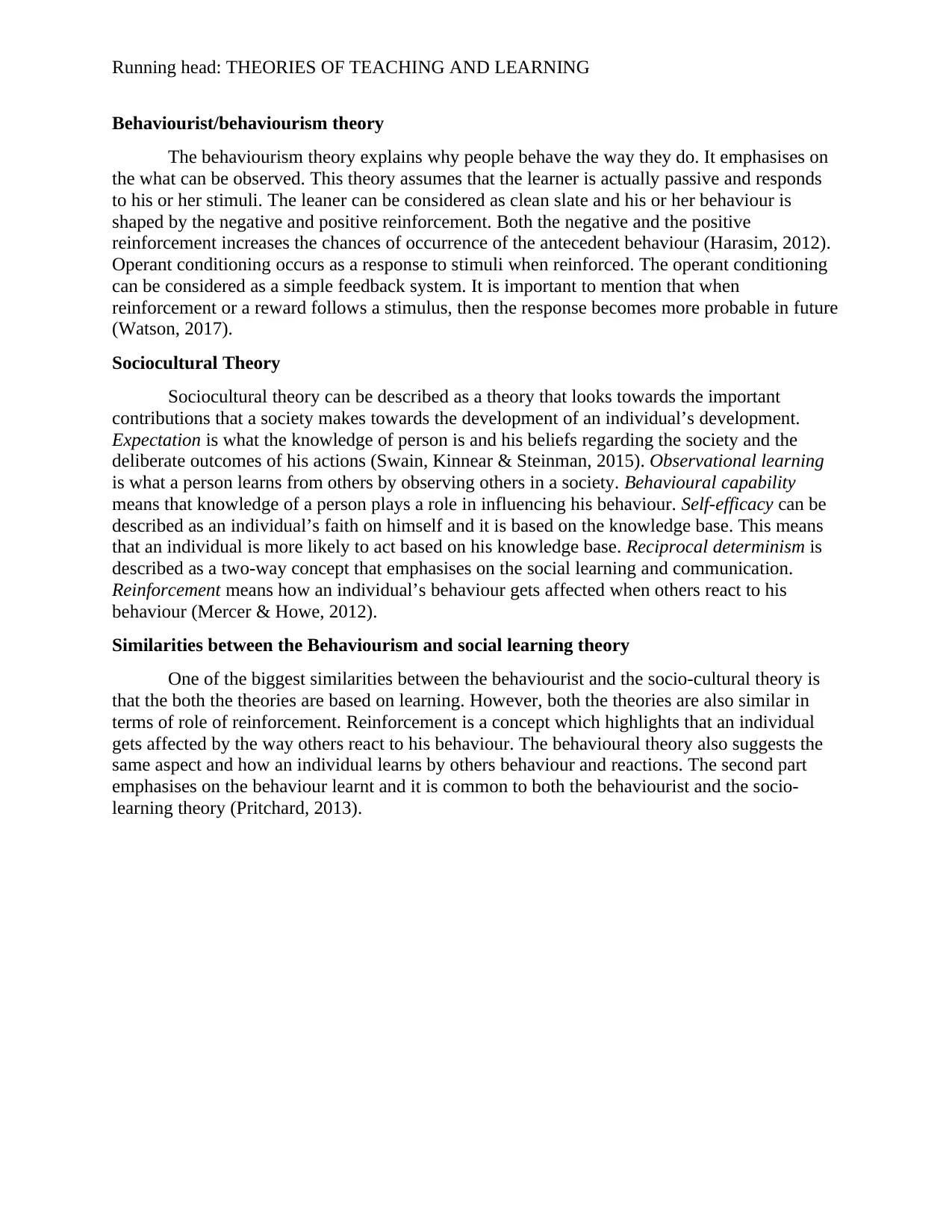
Running head: THEORIES OF TEACHING AND LEARNING
Behaviourist/behaviourism theory
The behaviourism theory explains why people behave the way they do. It emphasises on
the what can be observed. This theory assumes that the learner is actually passive and responds
to his or her stimuli. The leaner can be considered as clean slate and his or her behaviour is
shaped by the negative and positive reinforcement. Both the negative and the positive
reinforcement increases the chances of occurrence of the antecedent behaviour (Harasim, 2012).
Operant conditioning occurs as a response to stimuli when reinforced. The operant conditioning
can be considered as a simple feedback system. It is important to mention that when
reinforcement or a reward follows a stimulus, then the response becomes more probable in future
(Watson, 2017).
Sociocultural Theory
Sociocultural theory can be described as a theory that looks towards the important
contributions that a society makes towards the development of an individual’s development.
Expectation is what the knowledge of person is and his beliefs regarding the society and the
deliberate outcomes of his actions (Swain, Kinnear & Steinman, 2015). Observational learning
is what a person learns from others by observing others in a society. Behavioural capability
means that knowledge of a person plays a role in influencing his behaviour. Self-efficacy can be
described as an individual’s faith on himself and it is based on the knowledge base. This means
that an individual is more likely to act based on his knowledge base. Reciprocal determinism is
described as a two-way concept that emphasises on the social learning and communication.
Reinforcement means how an individual’s behaviour gets affected when others react to his
behaviour (Mercer & Howe, 2012).
Similarities between the Behaviourism and social learning theory
One of the biggest similarities between the behaviourist and the socio-cultural theory is
that the both the theories are based on learning. However, both the theories are also similar in
terms of role of reinforcement. Reinforcement is a concept which highlights that an individual
gets affected by the way others react to his behaviour. The behavioural theory also suggests the
same aspect and how an individual learns by others behaviour and reactions. The second part
emphasises on the behaviour learnt and it is common to both the behaviourist and the socio-
learning theory (Pritchard, 2013).
Behaviourist/behaviourism theory
The behaviourism theory explains why people behave the way they do. It emphasises on
the what can be observed. This theory assumes that the learner is actually passive and responds
to his or her stimuli. The leaner can be considered as clean slate and his or her behaviour is
shaped by the negative and positive reinforcement. Both the negative and the positive
reinforcement increases the chances of occurrence of the antecedent behaviour (Harasim, 2012).
Operant conditioning occurs as a response to stimuli when reinforced. The operant conditioning
can be considered as a simple feedback system. It is important to mention that when
reinforcement or a reward follows a stimulus, then the response becomes more probable in future
(Watson, 2017).
Sociocultural Theory
Sociocultural theory can be described as a theory that looks towards the important
contributions that a society makes towards the development of an individual’s development.
Expectation is what the knowledge of person is and his beliefs regarding the society and the
deliberate outcomes of his actions (Swain, Kinnear & Steinman, 2015). Observational learning
is what a person learns from others by observing others in a society. Behavioural capability
means that knowledge of a person plays a role in influencing his behaviour. Self-efficacy can be
described as an individual’s faith on himself and it is based on the knowledge base. This means
that an individual is more likely to act based on his knowledge base. Reciprocal determinism is
described as a two-way concept that emphasises on the social learning and communication.
Reinforcement means how an individual’s behaviour gets affected when others react to his
behaviour (Mercer & Howe, 2012).
Similarities between the Behaviourism and social learning theory
One of the biggest similarities between the behaviourist and the socio-cultural theory is
that the both the theories are based on learning. However, both the theories are also similar in
terms of role of reinforcement. Reinforcement is a concept which highlights that an individual
gets affected by the way others react to his behaviour. The behavioural theory also suggests the
same aspect and how an individual learns by others behaviour and reactions. The second part
emphasises on the behaviour learnt and it is common to both the behaviourist and the socio-
learning theory (Pritchard, 2013).
⊘ This is a preview!⊘
Do you want full access?
Subscribe today to unlock all pages.

Trusted by 1+ million students worldwide
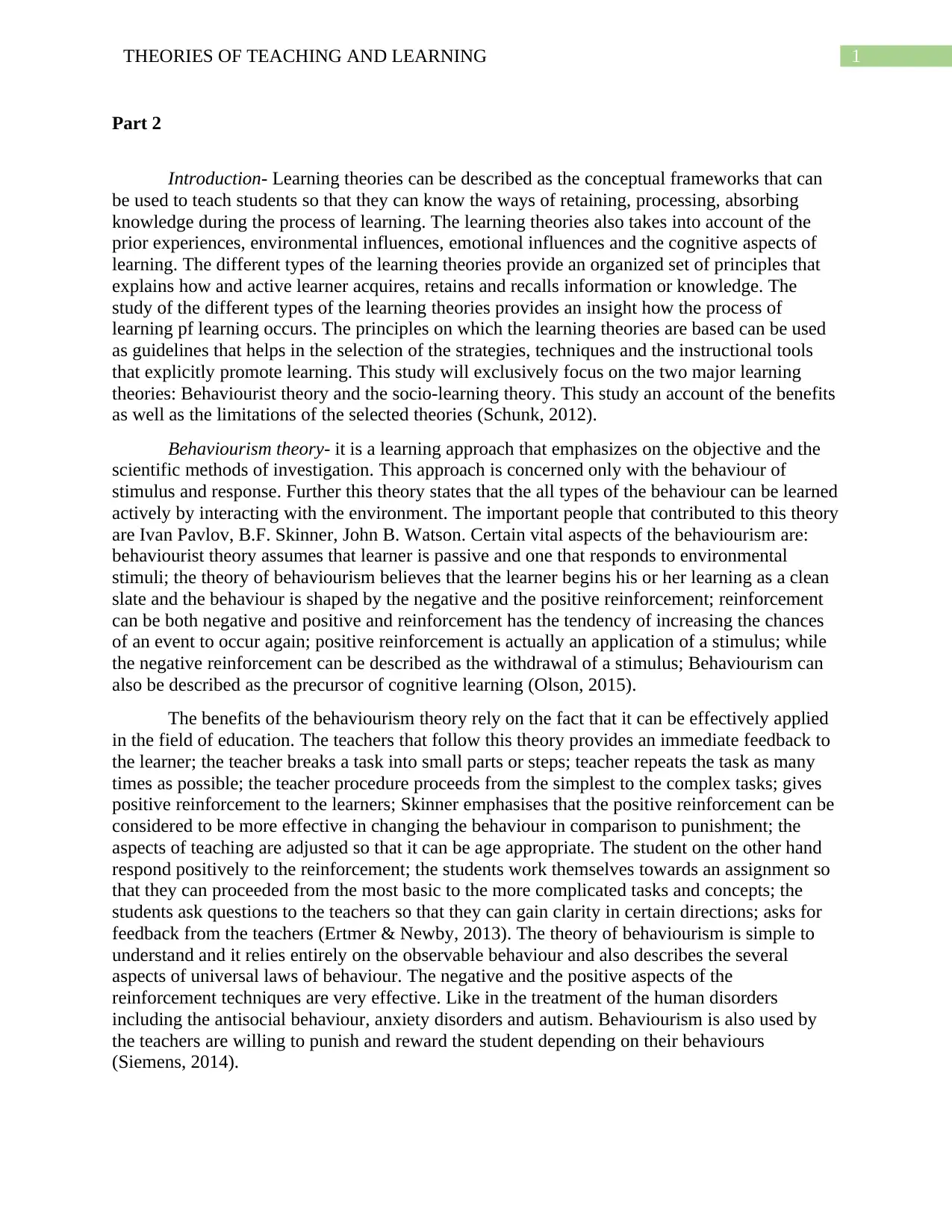
1THEORIES OF TEACHING AND LEARNING
Part 2
Introduction- Learning theories can be described as the conceptual frameworks that can
be used to teach students so that they can know the ways of retaining, processing, absorbing
knowledge during the process of learning. The learning theories also takes into account of the
prior experiences, environmental influences, emotional influences and the cognitive aspects of
learning. The different types of the learning theories provide an organized set of principles that
explains how and active learner acquires, retains and recalls information or knowledge. The
study of the different types of the learning theories provides an insight how the process of
learning pf learning occurs. The principles on which the learning theories are based can be used
as guidelines that helps in the selection of the strategies, techniques and the instructional tools
that explicitly promote learning. This study will exclusively focus on the two major learning
theories: Behaviourist theory and the socio-learning theory. This study an account of the benefits
as well as the limitations of the selected theories (Schunk, 2012).
Behaviourism theory- it is a learning approach that emphasizes on the objective and the
scientific methods of investigation. This approach is concerned only with the behaviour of
stimulus and response. Further this theory states that the all types of the behaviour can be learned
actively by interacting with the environment. The important people that contributed to this theory
are Ivan Pavlov, B.F. Skinner, John B. Watson. Certain vital aspects of the behaviourism are:
behaviourist theory assumes that learner is passive and one that responds to environmental
stimuli; the theory of behaviourism believes that the learner begins his or her learning as a clean
slate and the behaviour is shaped by the negative and the positive reinforcement; reinforcement
can be both negative and positive and reinforcement has the tendency of increasing the chances
of an event to occur again; positive reinforcement is actually an application of a stimulus; while
the negative reinforcement can be described as the withdrawal of a stimulus; Behaviourism can
also be described as the precursor of cognitive learning (Olson, 2015).
The benefits of the behaviourism theory rely on the fact that it can be effectively applied
in the field of education. The teachers that follow this theory provides an immediate feedback to
the learner; the teacher breaks a task into small parts or steps; teacher repeats the task as many
times as possible; the teacher procedure proceeds from the simplest to the complex tasks; gives
positive reinforcement to the learners; Skinner emphasises that the positive reinforcement can be
considered to be more effective in changing the behaviour in comparison to punishment; the
aspects of teaching are adjusted so that it can be age appropriate. The student on the other hand
respond positively to the reinforcement; the students work themselves towards an assignment so
that they can proceeded from the most basic to the more complicated tasks and concepts; the
students ask questions to the teachers so that they can gain clarity in certain directions; asks for
feedback from the teachers (Ertmer & Newby, 2013). The theory of behaviourism is simple to
understand and it relies entirely on the observable behaviour and also describes the several
aspects of universal laws of behaviour. The negative and the positive aspects of the
reinforcement techniques are very effective. Like in the treatment of the human disorders
including the antisocial behaviour, anxiety disorders and autism. Behaviourism is also used by
the teachers are willing to punish and reward the student depending on their behaviours
(Siemens, 2014).
Part 2
Introduction- Learning theories can be described as the conceptual frameworks that can
be used to teach students so that they can know the ways of retaining, processing, absorbing
knowledge during the process of learning. The learning theories also takes into account of the
prior experiences, environmental influences, emotional influences and the cognitive aspects of
learning. The different types of the learning theories provide an organized set of principles that
explains how and active learner acquires, retains and recalls information or knowledge. The
study of the different types of the learning theories provides an insight how the process of
learning pf learning occurs. The principles on which the learning theories are based can be used
as guidelines that helps in the selection of the strategies, techniques and the instructional tools
that explicitly promote learning. This study will exclusively focus on the two major learning
theories: Behaviourist theory and the socio-learning theory. This study an account of the benefits
as well as the limitations of the selected theories (Schunk, 2012).
Behaviourism theory- it is a learning approach that emphasizes on the objective and the
scientific methods of investigation. This approach is concerned only with the behaviour of
stimulus and response. Further this theory states that the all types of the behaviour can be learned
actively by interacting with the environment. The important people that contributed to this theory
are Ivan Pavlov, B.F. Skinner, John B. Watson. Certain vital aspects of the behaviourism are:
behaviourist theory assumes that learner is passive and one that responds to environmental
stimuli; the theory of behaviourism believes that the learner begins his or her learning as a clean
slate and the behaviour is shaped by the negative and the positive reinforcement; reinforcement
can be both negative and positive and reinforcement has the tendency of increasing the chances
of an event to occur again; positive reinforcement is actually an application of a stimulus; while
the negative reinforcement can be described as the withdrawal of a stimulus; Behaviourism can
also be described as the precursor of cognitive learning (Olson, 2015).
The benefits of the behaviourism theory rely on the fact that it can be effectively applied
in the field of education. The teachers that follow this theory provides an immediate feedback to
the learner; the teacher breaks a task into small parts or steps; teacher repeats the task as many
times as possible; the teacher procedure proceeds from the simplest to the complex tasks; gives
positive reinforcement to the learners; Skinner emphasises that the positive reinforcement can be
considered to be more effective in changing the behaviour in comparison to punishment; the
aspects of teaching are adjusted so that it can be age appropriate. The student on the other hand
respond positively to the reinforcement; the students work themselves towards an assignment so
that they can proceeded from the most basic to the more complicated tasks and concepts; the
students ask questions to the teachers so that they can gain clarity in certain directions; asks for
feedback from the teachers (Ertmer & Newby, 2013). The theory of behaviourism is simple to
understand and it relies entirely on the observable behaviour and also describes the several
aspects of universal laws of behaviour. The negative and the positive aspects of the
reinforcement techniques are very effective. Like in the treatment of the human disorders
including the antisocial behaviour, anxiety disorders and autism. Behaviourism is also used by
the teachers are willing to punish and reward the student depending on their behaviours
(Siemens, 2014).
Paraphrase This Document
Need a fresh take? Get an instant paraphrase of this document with our AI Paraphraser
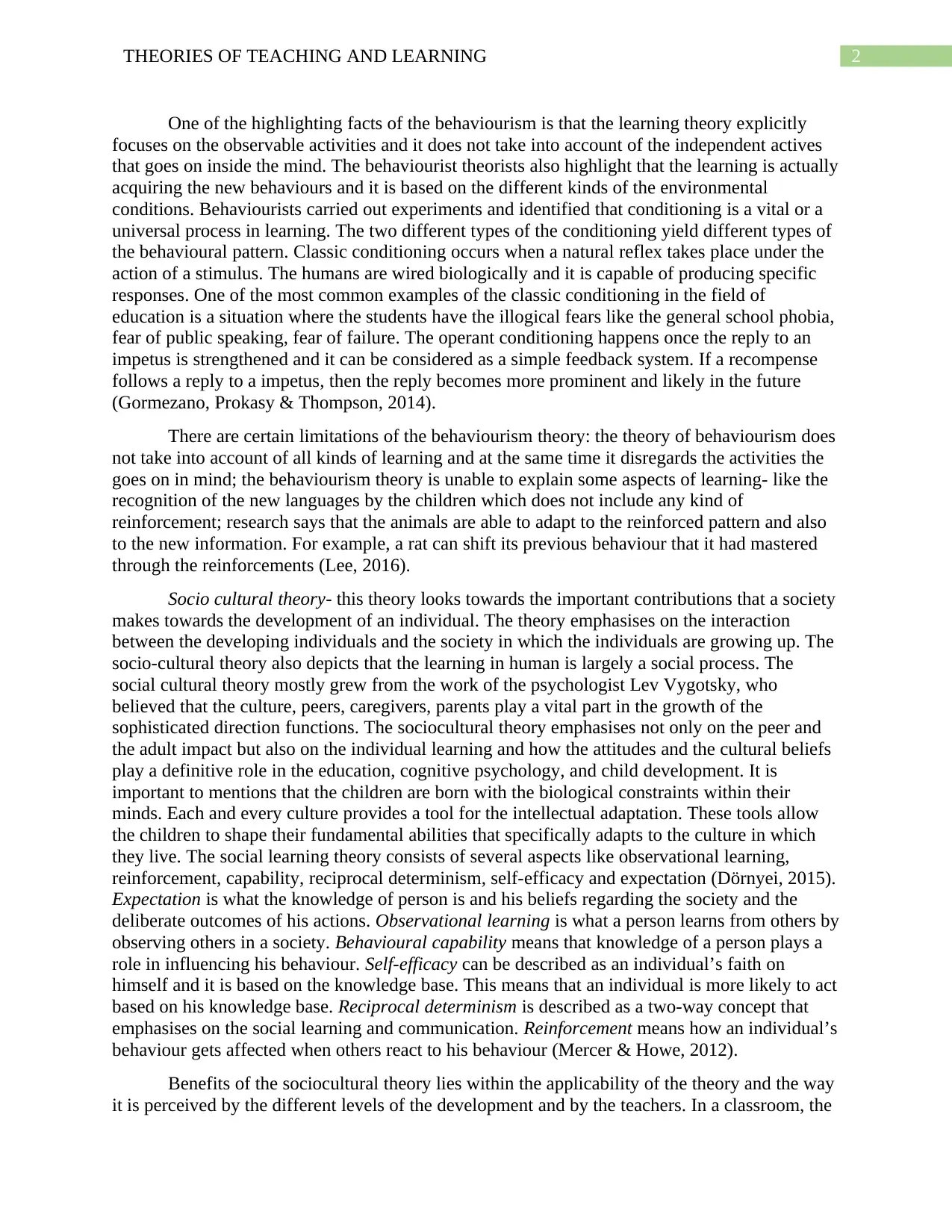
2THEORIES OF TEACHING AND LEARNING
One of the highlighting facts of the behaviourism is that the learning theory explicitly
focuses on the observable activities and it does not take into account of the independent actives
that goes on inside the mind. The behaviourist theorists also highlight that the learning is actually
acquiring the new behaviours and it is based on the different kinds of the environmental
conditions. Behaviourists carried out experiments and identified that conditioning is a vital or a
universal process in learning. The two different types of the conditioning yield different types of
the behavioural pattern. Classic conditioning occurs when a natural reflex takes place under the
action of a stimulus. The humans are wired biologically and it is capable of producing specific
responses. One of the most common examples of the classic conditioning in the field of
education is a situation where the students have the illogical fears like the general school phobia,
fear of public speaking, fear of failure. The operant conditioning happens once the reply to an
impetus is strengthened and it can be considered as a simple feedback system. If a recompense
follows a reply to a impetus, then the reply becomes more prominent and likely in the future
(Gormezano, Prokasy & Thompson, 2014).
There are certain limitations of the behaviourism theory: the theory of behaviourism does
not take into account of all kinds of learning and at the same time it disregards the activities the
goes on in mind; the behaviourism theory is unable to explain some aspects of learning- like the
recognition of the new languages by the children which does not include any kind of
reinforcement; research says that the animals are able to adapt to the reinforced pattern and also
to the new information. For example, a rat can shift its previous behaviour that it had mastered
through the reinforcements (Lee, 2016).
Socio cultural theory- this theory looks towards the important contributions that a society
makes towards the development of an individual. The theory emphasises on the interaction
between the developing individuals and the society in which the individuals are growing up. The
socio-cultural theory also depicts that the learning in human is largely a social process. The
social cultural theory mostly grew from the work of the psychologist Lev Vygotsky, who
believed that the culture, peers, caregivers, parents play a vital part in the growth of the
sophisticated direction functions. The sociocultural theory emphasises not only on the peer and
the adult impact but also on the individual learning and how the attitudes and the cultural beliefs
play a definitive role in the education, cognitive psychology, and child development. It is
important to mentions that the children are born with the biological constraints within their
minds. Each and every culture provides a tool for the intellectual adaptation. These tools allow
the children to shape their fundamental abilities that specifically adapts to the culture in which
they live. The social learning theory consists of several aspects like observational learning,
reinforcement, capability, reciprocal determinism, self-efficacy and expectation (Dörnyei, 2015).
Expectation is what the knowledge of person is and his beliefs regarding the society and the
deliberate outcomes of his actions. Observational learning is what a person learns from others by
observing others in a society. Behavioural capability means that knowledge of a person plays a
role in influencing his behaviour. Self-efficacy can be described as an individual’s faith on
himself and it is based on the knowledge base. This means that an individual is more likely to act
based on his knowledge base. Reciprocal determinism is described as a two-way concept that
emphasises on the social learning and communication. Reinforcement means how an individual’s
behaviour gets affected when others react to his behaviour (Mercer & Howe, 2012).
Benefits of the sociocultural theory lies within the applicability of the theory and the way
it is perceived by the different levels of the development and by the teachers. In a classroom, the
One of the highlighting facts of the behaviourism is that the learning theory explicitly
focuses on the observable activities and it does not take into account of the independent actives
that goes on inside the mind. The behaviourist theorists also highlight that the learning is actually
acquiring the new behaviours and it is based on the different kinds of the environmental
conditions. Behaviourists carried out experiments and identified that conditioning is a vital or a
universal process in learning. The two different types of the conditioning yield different types of
the behavioural pattern. Classic conditioning occurs when a natural reflex takes place under the
action of a stimulus. The humans are wired biologically and it is capable of producing specific
responses. One of the most common examples of the classic conditioning in the field of
education is a situation where the students have the illogical fears like the general school phobia,
fear of public speaking, fear of failure. The operant conditioning happens once the reply to an
impetus is strengthened and it can be considered as a simple feedback system. If a recompense
follows a reply to a impetus, then the reply becomes more prominent and likely in the future
(Gormezano, Prokasy & Thompson, 2014).
There are certain limitations of the behaviourism theory: the theory of behaviourism does
not take into account of all kinds of learning and at the same time it disregards the activities the
goes on in mind; the behaviourism theory is unable to explain some aspects of learning- like the
recognition of the new languages by the children which does not include any kind of
reinforcement; research says that the animals are able to adapt to the reinforced pattern and also
to the new information. For example, a rat can shift its previous behaviour that it had mastered
through the reinforcements (Lee, 2016).
Socio cultural theory- this theory looks towards the important contributions that a society
makes towards the development of an individual. The theory emphasises on the interaction
between the developing individuals and the society in which the individuals are growing up. The
socio-cultural theory also depicts that the learning in human is largely a social process. The
social cultural theory mostly grew from the work of the psychologist Lev Vygotsky, who
believed that the culture, peers, caregivers, parents play a vital part in the growth of the
sophisticated direction functions. The sociocultural theory emphasises not only on the peer and
the adult impact but also on the individual learning and how the attitudes and the cultural beliefs
play a definitive role in the education, cognitive psychology, and child development. It is
important to mentions that the children are born with the biological constraints within their
minds. Each and every culture provides a tool for the intellectual adaptation. These tools allow
the children to shape their fundamental abilities that specifically adapts to the culture in which
they live. The social learning theory consists of several aspects like observational learning,
reinforcement, capability, reciprocal determinism, self-efficacy and expectation (Dörnyei, 2015).
Expectation is what the knowledge of person is and his beliefs regarding the society and the
deliberate outcomes of his actions. Observational learning is what a person learns from others by
observing others in a society. Behavioural capability means that knowledge of a person plays a
role in influencing his behaviour. Self-efficacy can be described as an individual’s faith on
himself and it is based on the knowledge base. This means that an individual is more likely to act
based on his knowledge base. Reciprocal determinism is described as a two-way concept that
emphasises on the social learning and communication. Reinforcement means how an individual’s
behaviour gets affected when others react to his behaviour (Mercer & Howe, 2012).
Benefits of the sociocultural theory lies within the applicability of the theory and the way
it is perceived by the different levels of the development and by the teachers. In a classroom, the
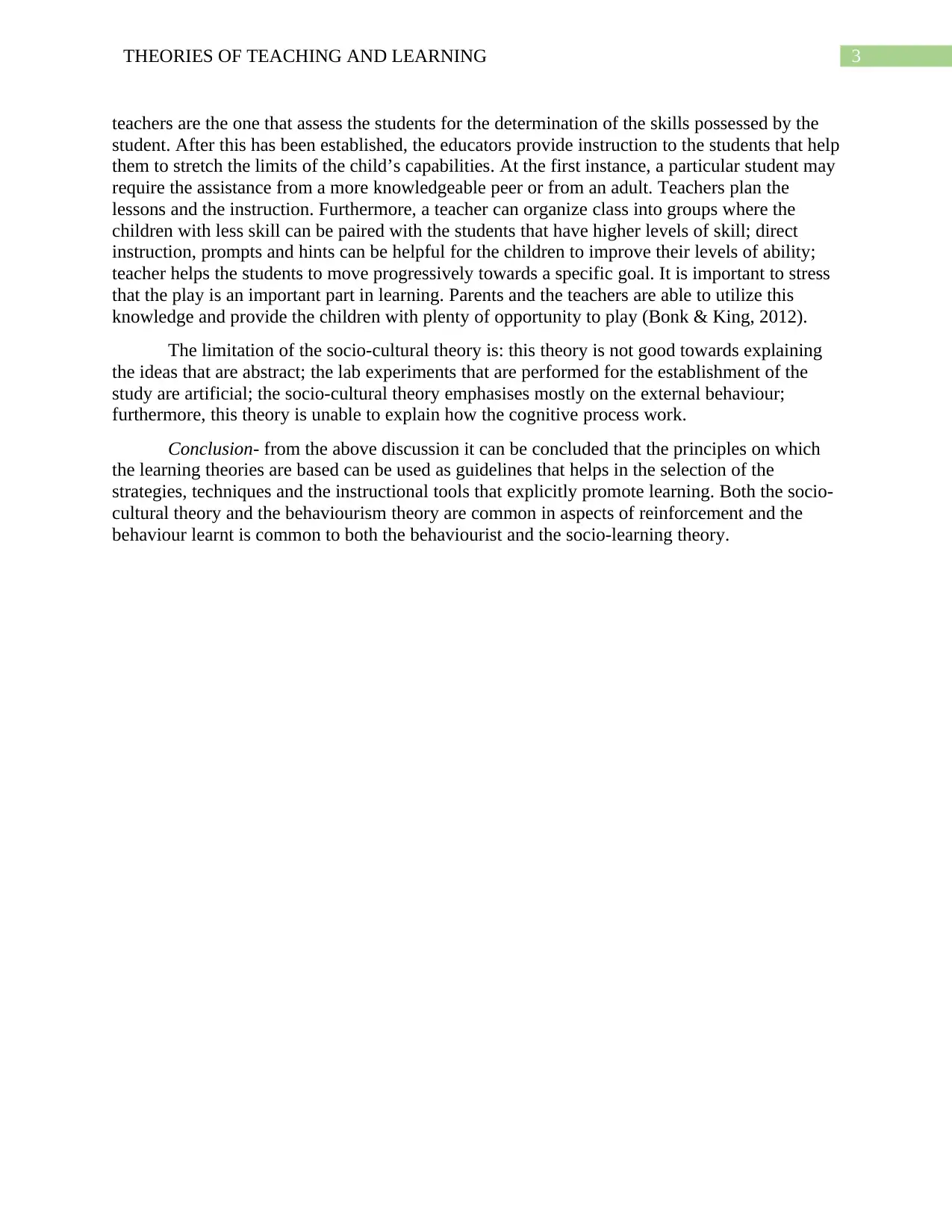
3THEORIES OF TEACHING AND LEARNING
teachers are the one that assess the students for the determination of the skills possessed by the
student. After this has been established, the educators provide instruction to the students that help
them to stretch the limits of the child’s capabilities. At the first instance, a particular student may
require the assistance from a more knowledgeable peer or from an adult. Teachers plan the
lessons and the instruction. Furthermore, a teacher can organize class into groups where the
children with less skill can be paired with the students that have higher levels of skill; direct
instruction, prompts and hints can be helpful for the children to improve their levels of ability;
teacher helps the students to move progressively towards a specific goal. It is important to stress
that the play is an important part in learning. Parents and the teachers are able to utilize this
knowledge and provide the children with plenty of opportunity to play (Bonk & King, 2012).
The limitation of the socio-cultural theory is: this theory is not good towards explaining
the ideas that are abstract; the lab experiments that are performed for the establishment of the
study are artificial; the socio-cultural theory emphasises mostly on the external behaviour;
furthermore, this theory is unable to explain how the cognitive process work.
Conclusion- from the above discussion it can be concluded that the principles on which
the learning theories are based can be used as guidelines that helps in the selection of the
strategies, techniques and the instructional tools that explicitly promote learning. Both the socio-
cultural theory and the behaviourism theory are common in aspects of reinforcement and the
behaviour learnt is common to both the behaviourist and the socio-learning theory.
teachers are the one that assess the students for the determination of the skills possessed by the
student. After this has been established, the educators provide instruction to the students that help
them to stretch the limits of the child’s capabilities. At the first instance, a particular student may
require the assistance from a more knowledgeable peer or from an adult. Teachers plan the
lessons and the instruction. Furthermore, a teacher can organize class into groups where the
children with less skill can be paired with the students that have higher levels of skill; direct
instruction, prompts and hints can be helpful for the children to improve their levels of ability;
teacher helps the students to move progressively towards a specific goal. It is important to stress
that the play is an important part in learning. Parents and the teachers are able to utilize this
knowledge and provide the children with plenty of opportunity to play (Bonk & King, 2012).
The limitation of the socio-cultural theory is: this theory is not good towards explaining
the ideas that are abstract; the lab experiments that are performed for the establishment of the
study are artificial; the socio-cultural theory emphasises mostly on the external behaviour;
furthermore, this theory is unable to explain how the cognitive process work.
Conclusion- from the above discussion it can be concluded that the principles on which
the learning theories are based can be used as guidelines that helps in the selection of the
strategies, techniques and the instructional tools that explicitly promote learning. Both the socio-
cultural theory and the behaviourism theory are common in aspects of reinforcement and the
behaviour learnt is common to both the behaviourist and the socio-learning theory.
⊘ This is a preview!⊘
Do you want full access?
Subscribe today to unlock all pages.

Trusted by 1+ million students worldwide
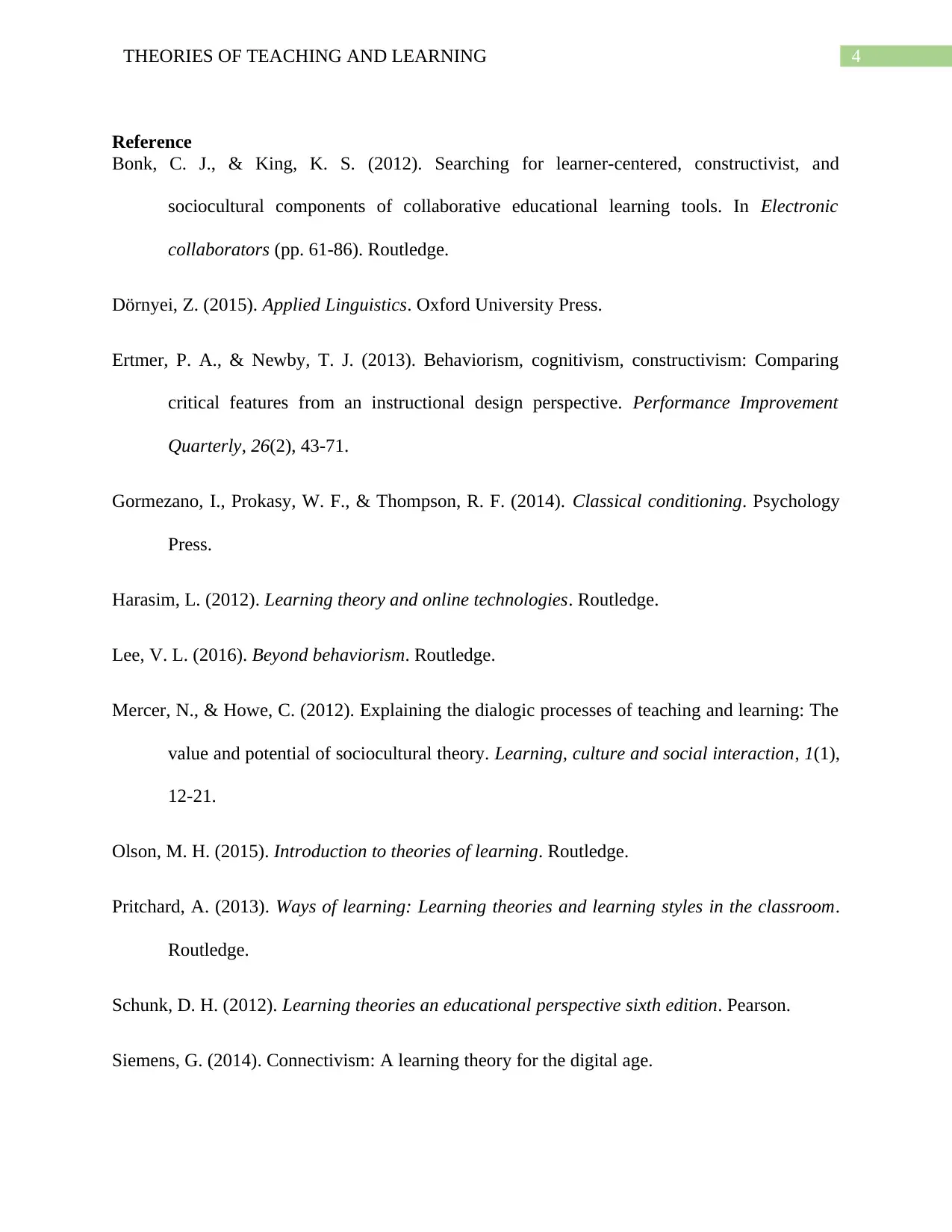
4THEORIES OF TEACHING AND LEARNING
Reference
Bonk, C. J., & King, K. S. (2012). Searching for learner-centered, constructivist, and
sociocultural components of collaborative educational learning tools. In Electronic
collaborators (pp. 61-86). Routledge.
Dörnyei, Z. (2015). Applied Linguistics. Oxford University Press.
Ertmer, P. A., & Newby, T. J. (2013). Behaviorism, cognitivism, constructivism: Comparing
critical features from an instructional design perspective. Performance Improvement
Quarterly, 26(2), 43-71.
Gormezano, I., Prokasy, W. F., & Thompson, R. F. (2014). Classical conditioning. Psychology
Press.
Harasim, L. (2012). Learning theory and online technologies. Routledge.
Lee, V. L. (2016). Beyond behaviorism. Routledge.
Mercer, N., & Howe, C. (2012). Explaining the dialogic processes of teaching and learning: The
value and potential of sociocultural theory. Learning, culture and social interaction, 1(1),
12-21.
Olson, M. H. (2015). Introduction to theories of learning. Routledge.
Pritchard, A. (2013). Ways of learning: Learning theories and learning styles in the classroom.
Routledge.
Schunk, D. H. (2012). Learning theories an educational perspective sixth edition. Pearson.
Siemens, G. (2014). Connectivism: A learning theory for the digital age.
Reference
Bonk, C. J., & King, K. S. (2012). Searching for learner-centered, constructivist, and
sociocultural components of collaborative educational learning tools. In Electronic
collaborators (pp. 61-86). Routledge.
Dörnyei, Z. (2015). Applied Linguistics. Oxford University Press.
Ertmer, P. A., & Newby, T. J. (2013). Behaviorism, cognitivism, constructivism: Comparing
critical features from an instructional design perspective. Performance Improvement
Quarterly, 26(2), 43-71.
Gormezano, I., Prokasy, W. F., & Thompson, R. F. (2014). Classical conditioning. Psychology
Press.
Harasim, L. (2012). Learning theory and online technologies. Routledge.
Lee, V. L. (2016). Beyond behaviorism. Routledge.
Mercer, N., & Howe, C. (2012). Explaining the dialogic processes of teaching and learning: The
value and potential of sociocultural theory. Learning, culture and social interaction, 1(1),
12-21.
Olson, M. H. (2015). Introduction to theories of learning. Routledge.
Pritchard, A. (2013). Ways of learning: Learning theories and learning styles in the classroom.
Routledge.
Schunk, D. H. (2012). Learning theories an educational perspective sixth edition. Pearson.
Siemens, G. (2014). Connectivism: A learning theory for the digital age.
Paraphrase This Document
Need a fresh take? Get an instant paraphrase of this document with our AI Paraphraser
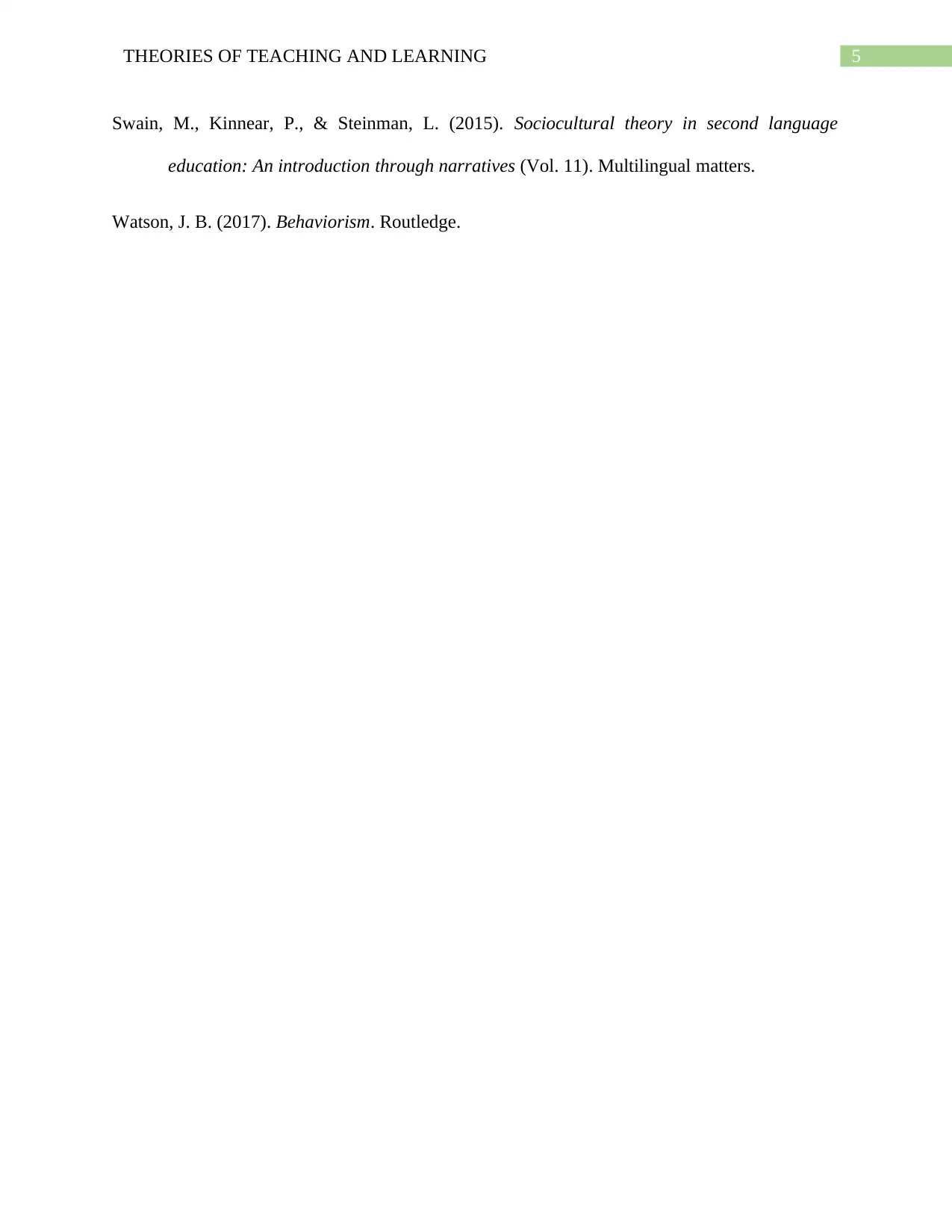
5THEORIES OF TEACHING AND LEARNING
Swain, M., Kinnear, P., & Steinman, L. (2015). Sociocultural theory in second language
education: An introduction through narratives (Vol. 11). Multilingual matters.
Watson, J. B. (2017). Behaviorism. Routledge.
Swain, M., Kinnear, P., & Steinman, L. (2015). Sociocultural theory in second language
education: An introduction through narratives (Vol. 11). Multilingual matters.
Watson, J. B. (2017). Behaviorism. Routledge.
1 out of 8
Related Documents
Your All-in-One AI-Powered Toolkit for Academic Success.
+13062052269
info@desklib.com
Available 24*7 on WhatsApp / Email
![[object Object]](/_next/static/media/star-bottom.7253800d.svg)
Unlock your academic potential
Copyright © 2020–2026 A2Z Services. All Rights Reserved. Developed and managed by ZUCOL.




